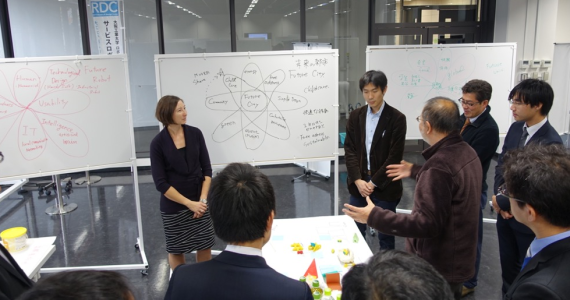
Applying Innovation Learning
The process is well documented in Carleton’s ‘Playbook for Strategic Foresight and Innovation’, and the foundation for the concept is her ‘Foresight Framework’, as Carleton puts it: What You Foresee Is What You Get. WYFIWIG may not catch-on as WYSIWIG did, but this principle has deep roots.
“People who believe they can change the world already possess a long-term vision of change. The individuals who make a difference in the world are proactive at heart, linking thinking and doing. In other words if you can imagine an improved future state, you can likely make it happen. Like an athlete, if you can picture yourself winning the race, you will increase your chances to realize the outcome you want.”
The Foresight Framework takes innovators through five phases: Perspective, Opportunity, Solution, Team and Vision. These all include key leadership and learning elements, such as curiosity, sense-making and collaboration, which the framework makes actionable.
The theory, of course, is one thing, but it is putting it into practice that is the second foundation of the framework, “You Can’t Put Off Tomorrow: Procrastination does not stop the future from happening”. Carleton has for several years been leading immersive tours of Silicon Valley where executives from across the world come for anywhere between three weeks and three months to experience how technology firms in the Silicon Valley innovation hotspot create successful creative environments.
Visiting innovation pioneers is a critical part of the process, but the real learning value comes in post-visit sessions where the participants are coached through facilitated discussions to unpack their observations and transform the experience into valuable learning ones.
The structure for Carleton’s Playbook comes from a wide range of sources, not least the D-School at Stanford and the university’s wider design community, and also the thinking from Clay Christensen’s Innovators’ DNA approach.
Christensen’s five ‘discovery skills’ highlighted in his 2009 HBR article and later in the Innovators’ DNA book, are well known now – associating, questioning, observing, experimenting and networking; the intriguing element being that these skills while identified by Christensen and his two co-authors Jeffrey Dyer and Hal Gregersen, as being vital for innovation are also skills we see being aligned with great leaders and for good learning. It is that intersection of key skills that Carleton focuses in on.
Taking the ‘associating’ theme Carleton will often ask participants in the post immersion visits to write down a single metaphor for what they saw. Do they see ‘cube farms’ as beehive like, or modular perhaps – these associations make it easier to create a common language and communicate more effectively discoveries and ideas to your team – and so build the ability to lead new concepts forward, making the process actionable, providing the ability to process new thinking into activity. The approach is underpinned with pragmatism “maybe your organization can’t, or isn’t ready, to do 80% of what you’ve seen – but you can still do 20%” Carleton observes – and by starting on the road you are fulfilling the second of the Foreseeing Frameworks two principles, mentioned above.
Tamara Carleton will be taking part in the Corporate Learning Circle’s 1st International Conference on Innovation in Berlin in June – which will be visiting several innovative enterprises in the city and Carleton will lead some ‘unpacking’ discussions following these to explore the learning.
(published with permission of iedp )